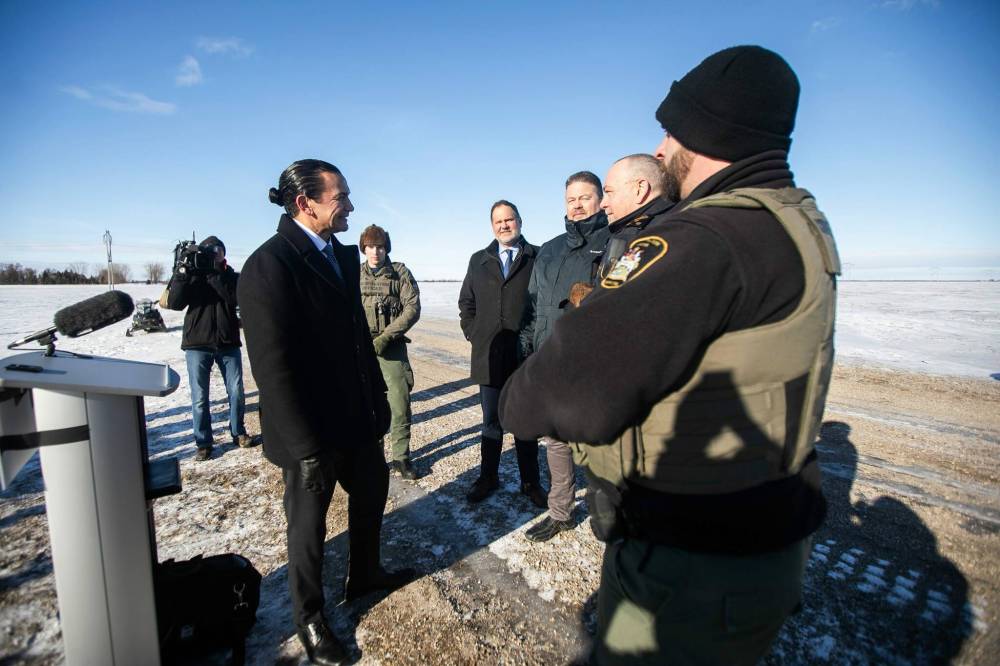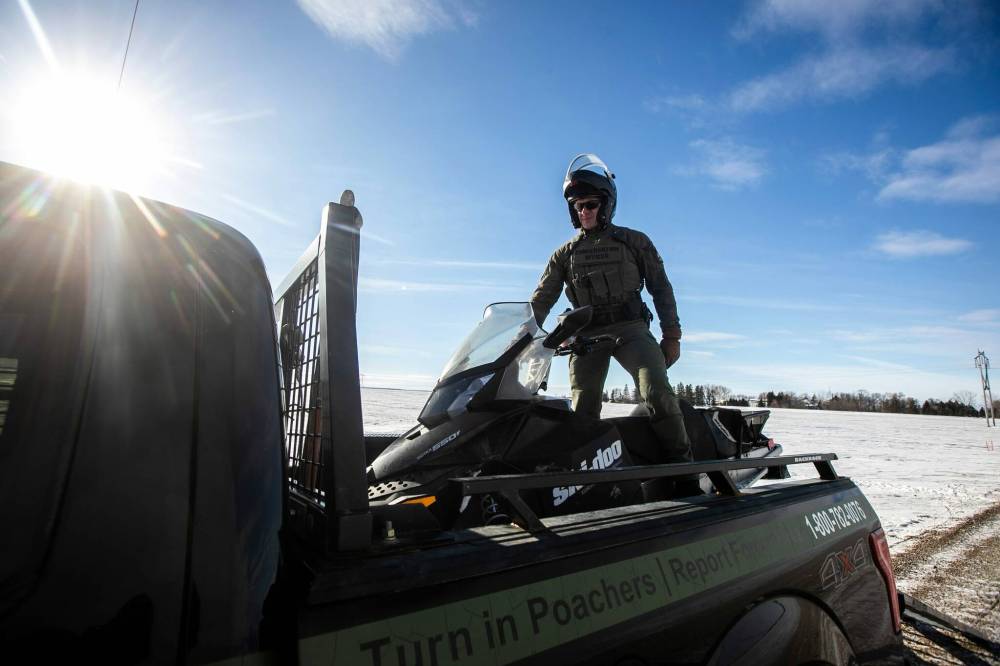Conservation officers add ‘additional set of eyes and ears’ at border Will patrol between ports of entry; no training offered, union says
Read this article for free:
or
Already have an account? Log in here »
To continue reading, please subscribe:
Monthly Digital Subscription
$0 for the first 4 weeks*
- Enjoy unlimited reading on winnipegfreepress.com
- Read the E-Edition, our digital replica newspaper
- Access News Break, our award-winning app
- Play interactive puzzles
*No charge for 4 weeks then price increases to the regular rate of $19.00 plus GST every four weeks. Offer available to new and qualified returning subscribers only. Cancel any time.
Monthly Digital Subscription
$4.75/week*
- Enjoy unlimited reading on winnipegfreepress.com
- Read the E-Edition, our digital replica newspaper
- Access News Break, our award-winning app
- Play interactive puzzles
*Billed as $19 plus GST every four weeks. Cancel any time.
To continue reading, please subscribe:
Add Free Press access to your Brandon Sun subscription for only an additional
$1 for the first 4 weeks*
*Your next subscription payment will increase by $1.00 and you will be charged $16.99 plus GST for four weeks. After four weeks, your payment will increase to $23.99 plus GST every four weeks.
Read unlimited articles for free today:
or
Already have an account? Log in here »
Hey there, time traveller!
This article was published 27/01/2025 (293 days ago), so information in it may no longer be current.
NEAR EMERSON — Nearly a dozen conservation officers are now patrolling along the Canada-United States border in hopes of increasing security and responding to threats from U.S. President Donald Trump.
Premier Wab Kinew announced Monday conservation officers stationed in Winnipeg, Steinbach, Manitou, Sprague, Boissevain and Virden are now patrolling between ports of entry, focusing on secondary roads and backcountry areas, and will provide “humanitarian” support should the border find more people attempting to cross from the U.S. into Canada, particularly in dangerous weather conditions.
“We’re asking for them to be deployed into areas to help us just be that additional set of eyes and ears,” Kinew told reporters at a news conference near Emerson.

MIKAELA MACKENZIE / FREE PRESS
Premier Wab Kinew chats with conservation officers near Emerson after making the announcement that Manitoba Conservation Officers will be patrolling the Canada-U.S. border, Monday.
Trump has repeatedly threatened to impose a 25 per cent tariff on incoming goods unless Canada works to prevent illegal border crossings into the U.S. and to decrease the amount of drugs being smuggled across. Those tariffs could be implemented on Feb. 1, Trump has said.
Kinew said the conservation officers, who are typically tasked with enforcement regarding wildlife, will work with RCMP and the Canada Border Services Agency. The province is spending $360,000 to re-deploy the officers, along with funding for snowmobiles and other utility vehicles. Another $460,000 will go toward overtime for RCMP officers at the border.
Tariff hotline
The provincial government launched a hotline Monday for those wondering what the potential impact of tariffs could be.
Questions about tariffs can be submitted at manitoba.ca/tariffresponse, at 204-945-3744 or toll-free at 1-866-626-4862, Premier Wab Kinew said Monday.
The provincial government launched a hotline Monday for those wondering what the potential impact of tariffs could be.
Questions about tariffs can be submitted at manitoba.ca/tariffresponse, at 204-945-3744 or toll-free at 1-866-626-4862, Premier Wab Kinew said Monday.
“If you’re a business, if you’re a worker, somebody who’s wondering about what the potential impacts of tariffs could be … we’ll be there to ensure that we have quick answers to the questions that you have about what we’re looking at.”
Staff answering the phone will have quick facts available, while more detailed questions will be answered within a day, Kinew said.
He announced the hotline last week, along with a U.S. trade council that will be composed of 16 leaders in business, labour groups and the private sector to advise him.
Conservation officers will only intervene in cases when they don’t suspect further criminal activity, like drug trafficking. In those cases, officers will be asked to report to Border Services and RCMP.
“If you see somebody trying to cross an open plain like this without gloves and hats on, then that would be a situation where there’d be that direct intervention,” Kinew said.
The premier said the move was part of the province’s planned response to Trump “at a time like this, when Manitobans are looking for reassurance,” but was also a response to calls border communities have made for years.
“If we were to go to Gretna, or Altona, or Emerson, or any community in the area, people will tell you they want to have a secure border, but they’ll also tell you they have a humanitarian heart for some of those very, very difficult situations we’ve heard of,” Kinew said.
Six people were arrested trying to cross the border into Manitoba Jan. 14, days before the U.S. president was sworn into office. RCMP said the six weren’t dressed for the weather, which dipped below -20 C.
Emerson-Franklin Reeve David Carlson said any additional boots on the ground near the border would help put his community at ease.
“People get themselves into a really bad situation quite often, and we don’t want any more tragedies out here with regards to people either losing their lives or being injured by the weather,” he said.
The Manitoba Government and General Employees’ Union said no extra officers are being hired specifically for border duties, and no extra training has been offered to existing workers.
The union said about 20 per cent of conservation officer jobs are vacant, and officers are already busy with their regular tasks, so it’s unclear how much additional work they can take on.
“It sounds like (officers’) routines may change a little, to be a little more towards the border, but overall, from what we understand, they’re going to do as much of their regular role as possible,” union president Kyle Ross said.
Kinew said vacancy rates for conservation officers have dropped from 20 per cent to 10 per cent under his government, while acknowledging he’d like to hire more.
Progressive Conservative Leader Wayne Ewasko said the border has “never been weaker” under the provincial NDP and federal Liberals.
“Conservation officers have an important job protecting public safety and our fish, wildlife, and forest resources, but pulling them away from their core duties to patrol the border is not a permanent solution,” he said in an emailed statement.

MIKAELA MACKENZIE / FREE PRESS
Conservation officer Nick Woroniuk loads a snowmobile onto conservation truck at the Canada-U.S. border near Emerson on Monday.
Immigration lawyer Alastair Clarke said his office has been fielding calls from Americans who disagree with Trump’s policies trying to come to Canada, and people in the U.S. without citizenship who are fearful of being deported.
Last week, Clarke said, a Venezuelan asylum seeker who had family in Manitoba called for help, saying he no longer felt safe in the U.S. He was turned back at the border.
If Trump’s 2016 presidency can provide any hindsight, he said, Manitoba will need additional help at the border.
“I don’t see it getting any better,” he said.
In 2022, a family from India froze to death while trying to cross the Manitoba-U.S. border. Two men were found guilty of human smuggling in November. They are set to be sentenced in March.
In 2016, two men from Ghana lost their fingers to frostbite while crossing the border. They became Canadian citizens in 2023.
“Those cases just break my heart,” Clarke said.
“When people are just trying to find safety, when they’re trying to be with their family members, when they are trying to find a better life. There is inherent risk in their journeys, but it is so sad when you hear about someone paying the ultimate price.”
Monday’s announcement comes one week after Black Hawk helicopters began patrolling the Manitoba-U.S. border. The chopper flights, along with drones, are part of the federal government’s $1.3-billion border security upgrade plan in response to Trump’s threats.
Kinew’s focus on the border — whether it be the conservation officers or recent announcement of a U.S. trade council and an office opening in Washington, D.C. — makes clear he isn’t waiting for Ottawa to lead on the issue, said Christopher Adams, an adjunct professor in political studies at the University of Manitoba.
“After Trump’s first inauguration, the federal government really did have one voice, and the premiers sort of were in lockstep with the federal government,” he said.
“This time around, there is a political vacuum in Ottawa … and so the premiers are all filling in with playing their own roles, representing their own interests in many ways, with dealing with the Trump threat of tariffs.”
— with files from The Canadian Press
malak.abas@freepress.mb.ca

Malak Abas is a city reporter at the Free Press. Born and raised in Winnipeg’s North End, she led the campus paper at the University of Manitoba before joining the Free Press in 2020. Read more about Malak.
Every piece of reporting Malak produces is reviewed by an editing team before it is posted online or published in print — part of the Free Press‘s tradition, since 1872, of producing reliable independent journalism. Read more about Free Press’s history and mandate, and learn how our newsroom operates.
Our newsroom depends on a growing audience of readers to power our journalism. If you are not a paid reader, please consider becoming a subscriber.
Our newsroom depends on its audience of readers to power our journalism. Thank you for your support.
History
Updated on Monday, January 27, 2025 6:20 PM CST: Adds quotes, details, new hed and deck. Updates photos










